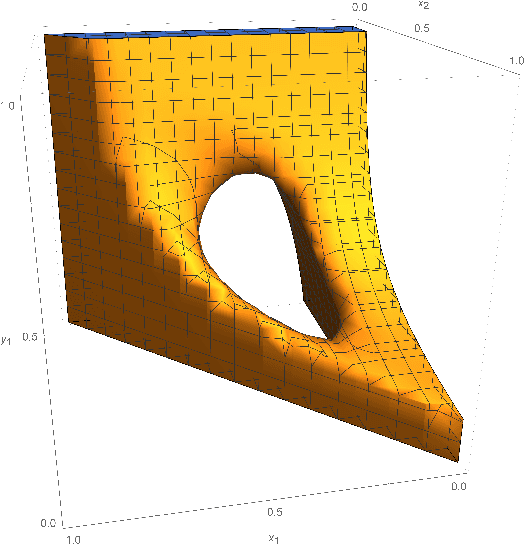Jason Milionis
Incentive-Compatible Recovery from Manipulated Signals, with Applications to Decentralized Physical Infrastructure
Mar 10, 2025Abstract:We introduce the first formal model capturing the elicitation of unverifiable information from a party (the "source") with implicit signals derived by other players (the "observers"). Our model is motivated in part by applications in decentralized physical infrastructure networks (a.k.a. "DePIN"), an emerging application domain in which physical services (e.g., sensor information, bandwidth, or energy) are provided at least in part by untrusted and self-interested parties. A key challenge in these signal network applications is verifying the level of service that was actually provided by network participants. We first establish a condition called source identifiability, which we show is necessary for the existence of a mechanism for which truthful signal reporting is a strict equilibrium. For a converse, we build on techniques from peer prediction to show that in every signal network that satisfies the source identifiability condition, there is in fact a strictly truthful mechanism, where truthful signal reporting gives strictly higher total expected payoff than any less informative equilibrium. We furthermore show that this truthful equilibrium is in fact the unique equilibrium of the mechanism if there is positive probability that any one observer is unconditionally honest (e.g., if an observer were run by the network owner). Also, by extending our condition to coalitions, we show that there are generally no collusion-resistant mechanisms in the settings that we consider. We apply our framework and results to two DePIN applications: proving location, and proving bandwidth. In the location-proving setting observers learn (potentially enlarged) Euclidean distances to the source. Here, our condition has an appealing geometric interpretation, implying that the source's location can be truthfully elicited if and only if it is guaranteed to lie inside the convex hull of the observers.
Swim till You Sink: Computing the Limit of a Game
Aug 20, 2024Abstract:During 2023, two interesting results were proven about the limit behavior of game dynamics: First, it was shown that there is a game for which no dynamics converges to the Nash equilibria. Second, it was shown that the sink equilibria of a game adequately capture the limit behavior of natural game dynamics. These two results have created a need and opportunity to articulate a principled computational theory of the meaning of the game that is based on game dynamics. Given any game in normal form, and any prior distribution of play, we study the problem of computing the asymptotic behavior of a class of natural dynamics called the noisy replicator dynamics as a limit distribution over the sink equilibria of the game. When the prior distribution has pure strategy support, we prove this distribution can be computed efficiently, in near-linear time to the size of the best-response graph. When the distribution can be sampled -- for example, if it is the uniform distribution over all mixed strategy profiles -- we show through experiments that the limit distribution of reasonably large games can be estimated quite accurately through sampling and simulation.
Nash, Conley, and Computation: Impossibility and Incompleteness in Game Dynamics
Mar 26, 2022


Abstract:Under what conditions do the behaviors of players, who play a game repeatedly, converge to a Nash equilibrium? If one assumes that the players' behavior is a discrete-time or continuous-time rule whereby the current mixed strategy profile is mapped to the next, this becomes a problem in the theory of dynamical systems. We apply this theory, and in particular the concepts of chain recurrence, attractors, and Conley index, to prove a general impossibility result: there exist games for which any dynamics is bound to have starting points that do not end up at a Nash equilibrium. We also prove a stronger result for $\epsilon$-approximate Nash equilibria: there are games such that no game dynamics can converge (in an appropriate sense) to $\epsilon$-Nash equilibria, and in fact the set of such games has positive measure. Further numerical results demonstrate that this holds for any $\epsilon$ between zero and $0.09$. Our results establish that, although the notions of Nash equilibria (and its computation-inspired approximations) are universally applicable in all games, they are also fundamentally incomplete as predictors of long term behavior, regardless of the choice of dynamics.
Differentially Private Regression with Unbounded Covariates
Feb 19, 2022Abstract:We provide computationally efficient, differentially private algorithms for the classical regression settings of Least Squares Fitting, Binary Regression and Linear Regression with unbounded covariates. Prior to our work, privacy constraints in such regression settings were studied under strong a priori bounds on covariates. We consider the case of Gaussian marginals and extend recent differentially private techniques on mean and covariance estimation (Kamath et al., 2019; Karwa and Vadhan, 2018) to the sub-gaussian regime. We provide a novel technical analysis yielding differentially private algorithms for the above classical regression settings. Through the case of Binary Regression, we capture the fundamental and widely-studied models of logistic regression and linearly-separable SVMs, learning an unbiased estimate of the true regression vector, up to a scaling factor.
 Add to Chrome
Add to Chrome Add to Firefox
Add to Firefox Add to Edge
Add to Edge